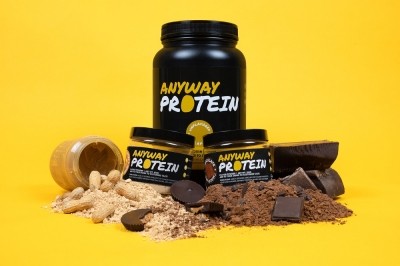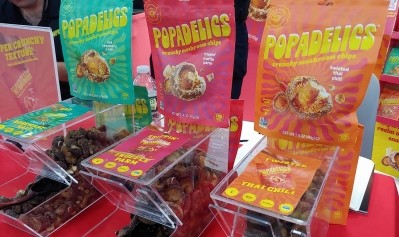Summer Fancy Food Show
Jack & Friends charts new ‘inclusive’ path for plant-based jerky to better meet taste, nutrition expectations
According to analysis by Data Bridge Market Research, the global plant-based jerky market is projected to grow at a compound annual rate of 5.5% through 2029 – notably faster, albeit off a smaller base, than meat jerky in the US, which IBISWorld estimates climbed at a compound annual growth rate of 1.1% over the past five years and projects will increase 1.1% in 2023 off a far larger base than plant-based options.
Driving this growth is rising consumer interest in plant-based options and continued high demand for protein-packed, on-the-go products, along with the entrance into the category of high-profile players, like Beyond Meat, which worked with PepsiCo to launch a plant-based jerky in March 2022. But many smaller players are also drawn to the space and the potential they see for long-term growth, including startup Jack & Friends, which showcased a trio of jackfruit-based jerky at the Summer Fancy Food Show in New York City late last month.
“We see a huge spike in interest in jerky and meat snacks along with the general health-conscious movement, because people are looking for high protein snacks that they can take on the go. Obviously, red meat is not the healthiest for you, and for people who are vegetarian, vegan or just looking for plant-based options, it is not serving those consumers at all. So, what we’ve seen is actually an increased interested in plant-based alternatives, specifically for jerky and other snacks” in the protein-packed space, Jessica Kwong, founder and CEO of Jack & Friends, told FoodNavigator-USA.
Within the plant-based jerky segment, she said, she sees two main sections and an unmet white space that Jack & Friends is trying to fill.
“We’ve seen the category get a little bit more crowded, especially in the past couple of years. What we see in the vegan jerky category, in general, is two main sections. So, we have soy- or wheat-based, which are higher in protein content, but obviously alienate the people who are allergic to those top food allergens. And then you have the increasingly popular [products] like mushroom or banana jerkies, which largely avoid those allergen issues, but you’re not getting the protein content or really the nutrition that people expect from jerky,” she said.
“We’re kind of filling that whitespace by giving you the best of both worlds,” she added.
She explained that Jack & Friends uses a blend of green jackfruit, which mimics the meaty texture of animal jerky, and pea protein to bump up the protein content to 13-15 grams per bag of jerky.
“Jack & Friends is a company built around inclusivity. So, we’re crafting food inclusive of different lifestyles, diets and allergy restrictions without sacrificing nutrition or quality,” she added, stressing her products are not only vegan but free of the top nine allergens, while still delivering a good source of protein and fiber.
Brand refresh positions products for omnichannel distribution
As the plant-based jerky set becomes more crowded, Kwong acknowledges that attention-grabbing packaging and clear branding will become more important, which is why Jack & Friends is undergoing a complete brand refresh that will better tell its story and better stand out on store shelves when the brand eventually enters brick-and-mortar stores.
“We have some fun branding with the Jack & Friends name. So, Jack is for jackfruit, which is the main ingredient, and then each friend is named after a different flavor. So, we have [Jack &] Tom for tomato poblano pepper, [Jack &] Barb for sweet barbeque, and [Jack &] Terry for ginger teriyaki,” she explained.
The new packaging features characters to better help consumers understand the inspiration for Jack and his friends and better highlights that the product is made from jackfruit, which Kwong says wasn’t coming across with the earlier packaging.
The new bags are also more brightly colored and forgo the window of the original packaging in favor of a picture of the jerk chips so that when the products eventually are placed on store shelves they stand out better.
Currently, the company is direct-to-consumer, but Kwong says she wants to expand into omnichannel and is looking for distribution in select brick and mortar stores. She also plans to expand the company’s portfolio beyond jerky to potentially include more center of the plate options.





















